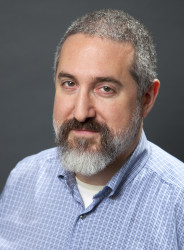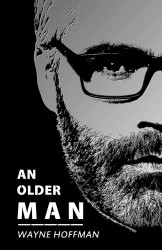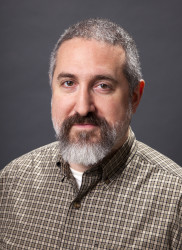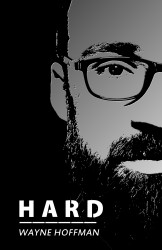Interview with author Wayne Hoffman
Strobing Limelight
 Award-winning novelist and journalist Wayne Hoffman offer a no-holds-barred look at gay life in his latest books. AN OLDER MAN, his newest release, is a sequel to his first novel, HARD, which is also being reprinted by Bear Bones Books. Together, the books follow a group of gay men searching for sex and romance against the backdrop of the AIDS epidemic, anti-gay repression, and the challenges they face simply by getting older.
Award-winning novelist and journalist Wayne Hoffman offer a no-holds-barred look at gay life in his latest books. AN OLDER MAN, his newest release, is a sequel to his first novel, HARD, which is also being reprinted by Bear Bones Books. Together, the books follow a group of gay men searching for sex and romance against the backdrop of the AIDS epidemic, anti-gay repression, and the challenges they face simply by getting older.
~
One of the reviews of Hard said: “think Woody Allen meets ACT UP.” That’s quite a combination—what does it mean?
Wayne Hoffman: To me, it means that there’s a lot of humor in the book, even though Hard is about very serious subjects: sex, politics, and AIDS. There’s anger, there’s lust, there’s jealousy and betrayal, but it’s the humor that ties the book together. The things the characters are dealing with are important—sometimes matters of life and death—but they keep their ability to laugh at themselves and each other. Well, most of them do.
WH: Hard centers on Moe Pearlman, a 20-something gay man in 1990s Manhattan. He’s sexually active—very much so—and a budding AIDS activist. But just as he’s trying to navigate his sexual and romantic exploits in the midst of the AIDS crisis, he keeps butting heads with Frank DeSoto, an older journalist and veteran activist who has a very different idea about sex and politics. As the city cracks down on gay sex, Moe and Frank end up on different sides of a personal and political battle.
A lot of Hard sounds like it’s based on real life.
WH: Hard came out of a very specific time in the 1990s, a turning point in the AIDS crisis. On the one hand, new drug treatments were transforming AIDS into something that was potentially more manageable. But on a political level, AIDS was still being used as a political football in the most cynical way by people who hated gay men, as well as those who pretended to be our friends. Sadly, two decades later, even though some of the specifics have changed, the broader story is still familiar.
In An Older Man, you come back to Moe’s life, about 15 years later. Did you always plan to revisit him?
WH: Readers have often asked me what ever happened to Moe and the rest of the guys in Hard, and I always said I honestly didn’t know. Then, after several years, I realized that I did know what happened to them—because they’d be going through things a lot of gay men go through as we get older. So I got started on the sequel.
 Do all the characters in Hard come back in An Older Man?
Do all the characters in Hard come back in An Older Man?
WH: Yes and no. Moe is the main character in both books, and some of the other characters show up again in An Older Man; his ex-boyfriend Gene and best friend Aaron are back, for instance, although Moe’s relationships with them have evolved over the years. A couple other people from Hard get mentioned in passing, but they’re not really part of Moe’s life anymore…and some new people have joined him.
An Older Man takes place during Bear Week in Provincetown. Why take the action outside New York?
WH: Like many of us, Moe needs to step outside of his everyday life to truly understand what he’s going through. His sexual appetite hasn’t changed much, but after spending decades chasing older men, he’s starting to find that he can’t attract the men he’s used to attracting quite so reliably anymore, now that he’s over 40 himself. Bear Week is a very intense vacation—sort of a sexual carnival, a solid week of non-stop fun—that makes it apparent to Moe that the way he’s been doing things for 20 years isn’t working anymore.
For gay men, is there sex after 40?
WH: Yes. God, yes. It’s different from sex when you’re younger, but I’ll tell you something that nobody under 40 will truly understand or believe: I’ve found that it’s even better than it was in my 20s. And it was pretty damn good back then.
There is definitely a lot of sex in both books, but it’s not pornographic. What’s the difference, to you, between sexually explicit fiction and porn?
WH: The motivation. My books are explicit because the specific details are essential to the story, if you want to understand the characters’ desires and vulnerabilities and the risks they’re willing to take. In porn, the point is to turn the reader on. If my intention was to write porn—there’s nothing wrong with writing porn, mind you, but it’s not what I’m trying to do—the scenes might be a bit more titillating, a little more rooted in fantasy than very concrete reality. My husband pointed out that even thought there are a lot of sex scenes in Hard, in most of them, something goes wrong. That doesn’t happen in porn, where there’s almost always a happy ending.
In Hard, there’s an inkling that Moe might be intrigued by bear culture—he even poses for a magazine called Woof. But in An Older Man, he’s more explicitly bear-identified. What finally drew him in?
WH: Back in the 1990s, Moe knew that he liked hairy guys, older guys. As he became a hairy, older guy himself—with a gut that wasn’t going away any time soon—he naturally gravitated to the place where he felt not only tolerated but actually embraced for his looks.
 How much of Moe Pearlman is based on you?
How much of Moe Pearlman is based on you?
WH: I’m less neurotic than Moe, and happily married, so I’m not searching for Mister Right—I found him a long time ago. But Moe and I both share anxieties about our bodies and have similar tastes in men, and similar notions about sexual politics and chosen families. If you’re asking if my sexual skills measure up to Moe’s, well …
How can readers find out more about your books, and your events?
WH: They can check out waynehoffmanwriter.com for the latest updates.

